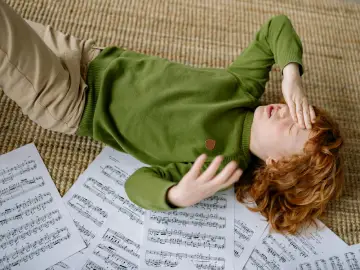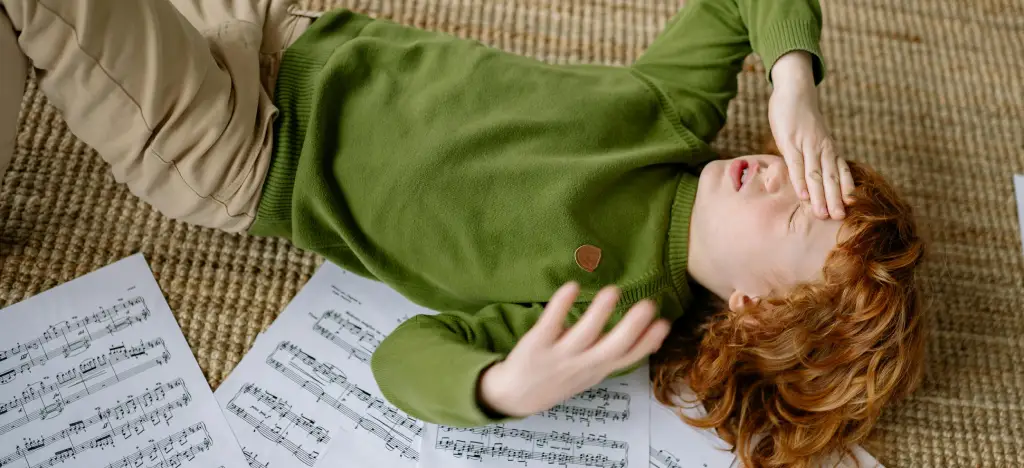I gave up music for over ten years.
At first, it was burnout. I’d been classically trained, drilled to play the “right” way, and somewhere along the line, I just stopped enjoying it. But I didn’t stop on purpose. I just drifted away — like so many people do.
One day turns into a month. A month turns into a decade.
But the weird thing is, the desire never really goes. That feeling of something missing. That part of you that lit up when you played — still quietly hoping for a way back in.
The good news? It’s not too late. In fact, science suggests picking up music again as an adult can be even more rewarding.
Let’s look at why so many of us stop — and how to restart with something that actually fits your life now.
- Reasons we stop learning music
- Loss of confidence — and the myth of being 'too old'
- What actually helps adults start learning music again
- What if you’ve never played music before?
- Ready to start again — or for real this time?
- FAQ: Restarting music as an adult
Reasons we stop learning music
1. We internalise the myth of musical talent
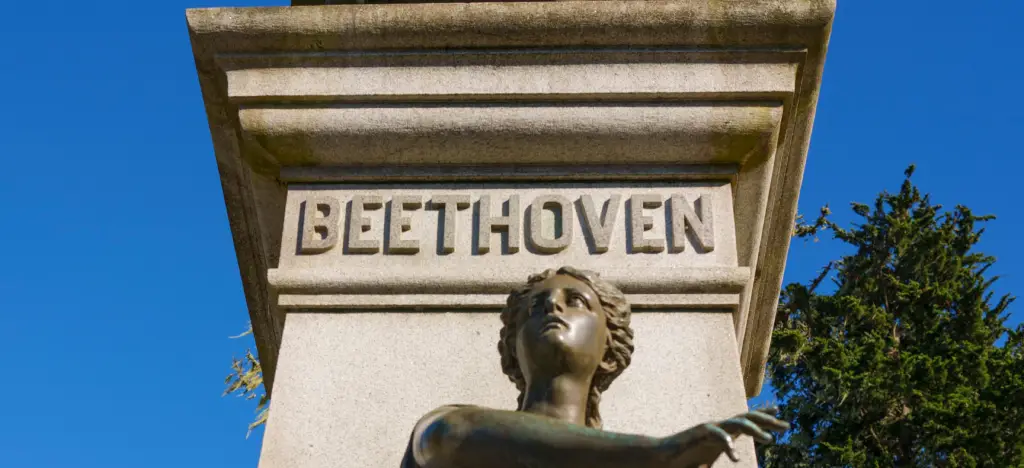 Ask most people why they gave up music and you’ll hear something like:
Ask most people why they gave up music and you’ll hear something like:
“I just wasn’t naturally good at it.”
That’s the “gifted child” myth talking. If you didn’t pick it up fast at school, you weren’t musical. End of story.
But that’s not how learning works — especially not for adults.
Carol Dweck’s research on growth mindset has shown for years that people who believe skills can be developed — rather than fixed at birth — tend to persist longer and improve more. Talent, it turns out, often just looks like someone who didn’t quit.
A 2019 meta-analysis in Perspectives on Psychological Science backed this up: learners who believed they could improve were more likely to keep going, especially when the task got tough.
And for adults, the effect may be even stronger. A 2022 study from UC Riverside found that older learners with a growth mindset saw significantly greater cognitive gains when learning new skills, including creative ones like music, compared to their fixed-mindset peers.
🎧 Examples? Many successful musicians weren’t “naturals”:
Debbie Harry (Blondie) was rejected from choir because she couldn’t sing in tune.
Noel Gallagher, who only picked up a guitar in his 20s after a work accident — and ended up writing the songs that defined a generation.
👉 Swap the mindset: Musical talent isn’t a birthright — it’s built through habits, resilience, and the guts to try again.
💡 ARTMASTER TIP: Still wondering if it’s too late to learn? Can anyone learn to sing? Why talent isn’t everything breaks down the science — and proves that natural ability is only part of the story.
2. Music education wasn’t built for you
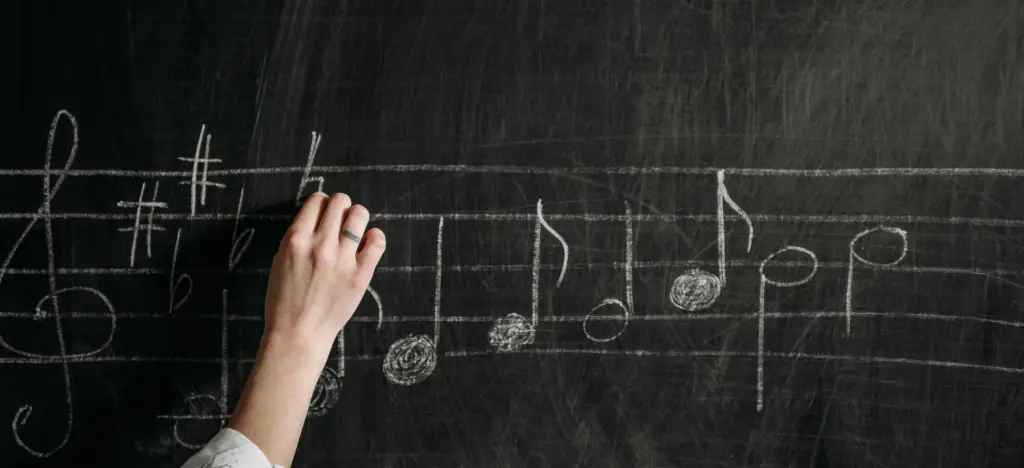 Think back to your early music lessons. What did they focus on? Probably theory, sight-reading, discipline, and exam pieces — not songwriting, improvisation, or playing by ear.
Think back to your early music lessons. What did they focus on? Probably theory, sight-reading, discipline, and exam pieces — not songwriting, improvisation, or playing by ear.
That’s because traditional music education was built to serve institutions, not individuals.
And for many adults, it just didn’t stick.
Research shows why this matters: when learners aren’t engaged, motivation collapses. A UCL review of musical motivation models concluded that enjoyment and self-belief are far stronger predictors of persistence than skill level or external structure
Dr Susan Hallam’s work at UCL goes further. Her studies show that autonomy — having a say in what you play — is crucial. When learners choose music they like, motivation increases. Even when life gets busy, they’re more likely to keep going.
🎶 So skip the grade books. Start with a song you love. Learn it your way. Whether it’s chords, by ear, or with help from tools like Artie, connection fuels consistency. Passion keeps the habit alive. The structure can come later.
3. Life got loud — and music felt optional 🎵
 Between jobs, family commitments, and bills, finding time for music can feel impossible. It’s easy to label it indulgent — but the research tells us exactly the opposite: music isn’t a luxury. It’s essential.
Between jobs, family commitments, and bills, finding time for music can feel impossible. It’s easy to label it indulgent — but the research tells us exactly the opposite: music isn’t a luxury. It’s essential.
A 2021 review published in Frontiers in Psychology found that playing music as an adult benefits more than just your mood — it improves memory, attention, self-regulation, and even builds white-matter in key brain areas.
Another study, featured on NIH’s PMC, showed that adult learners who took up instruments developed stronger connections in the brain’s motor-to-auditory pathways, proof that the brain rewires in response to new practice, even later in life (source).
🕰️ Think of ten minutes of music a day not as a distraction from your responsibilities but as vital maintenance. It strengthens your brain and clears your mind just as effectively as exercise or meditation.
💡 ARTMASTER TIP: Before you tell yourself it’s too late, check these out. They’re proof that starting (or restarting) music isn’t just doable — it’s one of the best things you can do for your mind and body:
Why learning music is one of the best things your child can do — and no, it’s not just for kids.
Can playing music help you live longer? Science says yes — the physical and mental health impact is real.
How learning music benefits the brain and body — memory, focus, mood, and more. It’s all in here.
 💡 Learn to play piano songs with just 10 minutes a day
💡 Learn to play piano songs with just 10 minutes a day
Meet Artie — the world’s first AI piano teacher that actually listens to your playing and gives real-time feedback to help you improve faster.
Download Artie for free now
Loss of confidence — and the myth of being 'too old'
But even when we do find the time, something else often gets in the way — something quieter, but more powerful: self-doubt.
We lose confidence in our musical ability after a long break
Does starting again mean starting from scratch? Not even close.
If you haven’t touched an instrument in years, it’s easy to assume you’ve lost everything — the muscle memory, the timing, the feel. But the truth is, you haven’t. You’ve just gone quiet.
A 2017 study published in Neuroscience found that even after years of no practice, adult musicians retained strong auditory–motor connections — suggesting your brain doesn’t forget how to play, it just needs reactivating.
Think of it like returning to the gym. You’ll be rusty at first. But the foundations are still there. Your brain remembers the patterns, your fingers remember the shapes — you just need to ease back in.
🧠 Start slow, stay kind:
Don’t expect to sound like you did ten years ago. But don’t underestimate how quickly it can come back. Play for enjoyment, not perfection — and trust that progress will follow.
We feel “too old to start again”
It’s one of the most common beliefs — and one of the most damaging.
But age doesn’t block learning. In fact, older learners often have more patience, focus, and emotional connection to the music.
A 2022 study in Frontiers in Psychology found that adults who engaged in musical training showed improvements in attention, memory, and emotional regulation — regardless of age.
🧠 Tip: Flip the narrative. You’re not too old. You’re finally at the perfect age to play for yourself — not for grades, teachers, or anyone else.
What actually helps adults start learning music again
1. Make it easy to start playing music
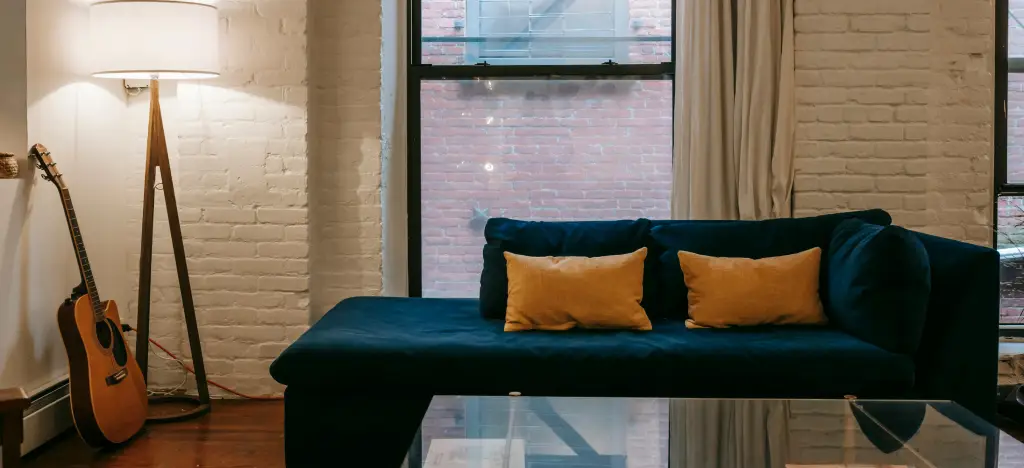 Not perfect. Not ideal. Just easy.
Not perfect. Not ideal. Just easy.
If you haven’t played in years, don’t set the bar at “relearn every chord” or “write a new song this week.” Set the bar at: pick up the instrument. Touch the keys. Strum a string.
Leave your guitar out of the case. Plug in your keyboard. Set your phone down with a timer for 5 minutes and just play something — anything. Sing along to a track you love. Mess around. The goal is to make the start frictionless.
Why? Because motivation usually follows action — not the other way round.
This is backed up by research. A study in The Journal of Research in Music Education found that early success has a measurable impact on adult learners’ confidence and persistence. When people feel a sense of progress quickly, they’re far more likely to come back the next day.
It’s not about talent. It’s about making the start small enough to happen.
🎯 Try this:
Choose a song you already love (bonus points if you know the lyrics)
Learn just the chorus, or the intro riff — not the whole thing
Don’t worry about speed or polish. Focus on flow.
Play for 5–10 minutes. Then stop.
You don’t need to rebuild your musical identity in one session. You just need a spark. Something small, satisfying, and doable enough that you’ll want to try again tomorrow.
💡ARTMASTER TIP: Want a low-pressure way back in? Try learning a few songs that only need 3 or 4 chords. These guides are packed with real examples to get your fingers moving again:
2. Don’t go it alone
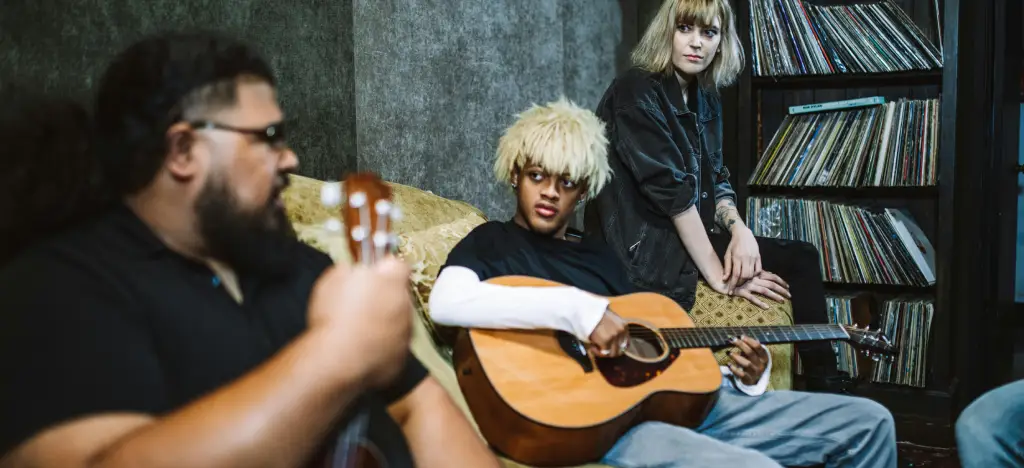 Learning in isolation is one of the biggest predictors of dropout — especially for adults. Without accountability, feedback or connection, motivation drifts.
Learning in isolation is one of the biggest predictors of dropout — especially for adults. Without accountability, feedback or connection, motivation drifts.
Recent research backs this up. A 2022 PhD thesis from the Royal College of Music explored group music-making with older adults and student musicians. It found that participants reported stronger engagement, higher motivation, and greater well-being compared to those practising alone (source).
Another study on group singing found that it significantly boosts social bonding, emotional resilience, and personal fulfilment — all key drivers of long-term participation (nature.com).
👥 So build your own music circle:
Join a local class or community ensemble
Take an online course with feedback
Ask a friend to check in on your progress regularly
Even sharing a weekly video with someone can keep you playing
You don’t need a full band — just someone who cares if you stop.
3. Forget the old rules
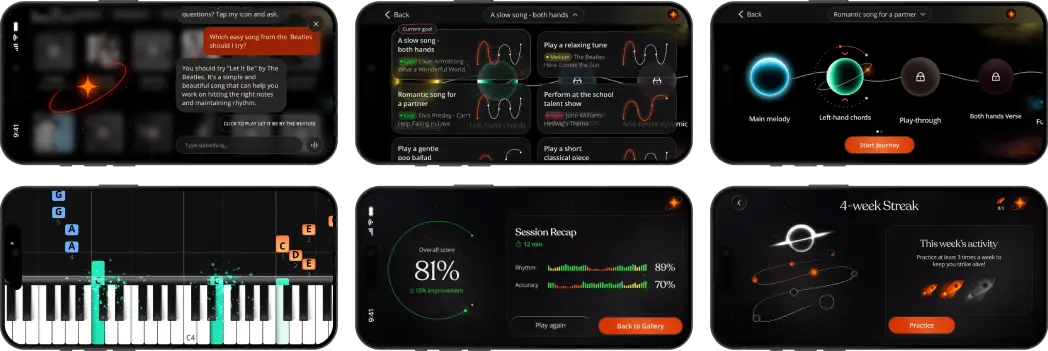 There’s no single path to learning music anymore. You don’t need to read sheet music, pass exams, or even follow a grade-based curriculum. What you need is curiosity, consistency, and a structure that fits you — not what the system told you.
There’s no single path to learning music anymore. You don’t need to read sheet music, pass exams, or even follow a grade-based curriculum. What you need is curiosity, consistency, and a structure that fits you — not what the system told you.
Modern studies highlight how technology and informal learning have reshaped adult musicianship. A 2021 study on Music Learning and New Media found that self-directed, informal approaches — using videos, backing tracks, loop pedals, and apps — help adult learners stay engaged and build real skills at their own pace . Another 2024 analysis in Adults’ Engagement in Music Learning showed that learners using online coaching for instruments like guitar or piano reported higher motivation and long-term involvement compared to those using traditional methods
Tech isn’t the whole story — it’s the choice that matters. And the choice is yours.
🎹 Play your own way. Watch a YouTube tutorial. Learn a chord chart. Loop a 30-second riff. Build from there. You’re not a teenager anymore — you can tailor your learning to fit your life, and that flexibility is what really keeps you going.
What if you’ve never played music before?
“I’ve always wanted to play — but I missed my chance.”
I hear this all the time. As if there’s some invisible deadline where your brain says, “Sorry, you’re too old now — no more music for you.”
But that’s not how it works. Beginners in their 30s, 40s, 50s and beyond aren’t just possible — they’re thriving. Honestly, I’ve seen people pick up an instrument later in life and connect with it more deeply than any teenager I’ve taught.
You don’t need to have played as a kid. You don’t need to be “naturally talented.” You just need a starting point.
Some of the easiest ways in?
Piano – intuitive, visual, and satisfying from the first note
Ukulele – cheap, portable, and gentle on your fingers
Voice – always with you, zero setup, totally yours
If you can speak, you can sing. If you can tap your foot, you can play. And if you can give it 10 minutes a day, you might be surprised how quickly it starts to feel like something you do.
Ready to start again — or for real this time?
If music’s been calling you back — even just quietly — maybe this is the sign to answer.
ArtMaster has courses in piano, guitar, singing, production and more — all taught by Grammy winners, viral artists, and people who actually play for a living. No pressure. No gatekeeping. Just the kind of teaching I wish I’d had years ago.
Honestly? I wish I’d started again sooner. But I’m glad I finally did.
👉 Start your 7-day free trial and get instant access to every ArtMaster course.
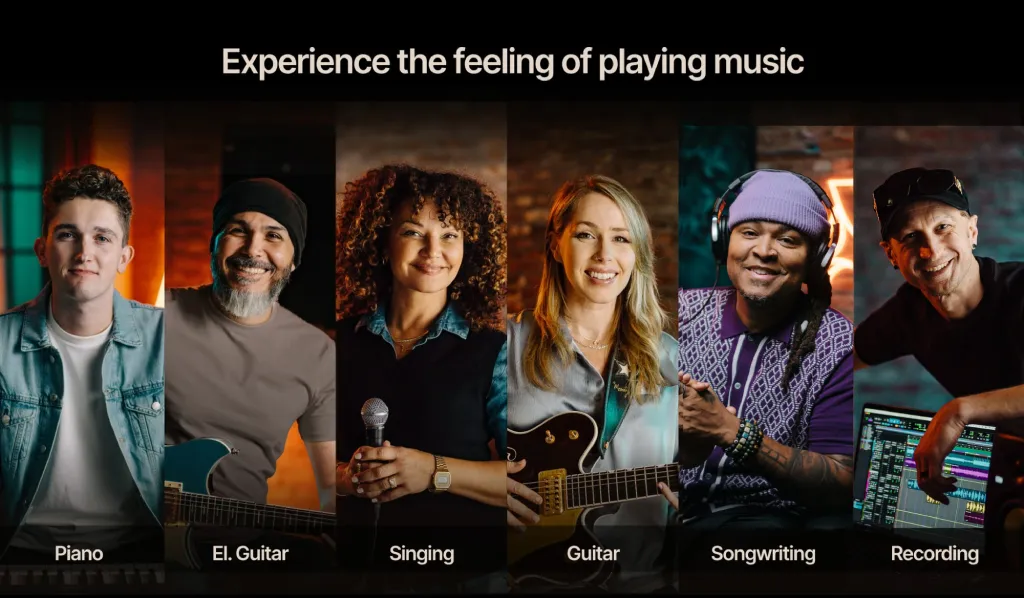
FAQ: Restarting music as an adult
Am I too old to learn an instrument?
Not at all. Research shows that adults can learn music just as well — and often better — than younger learners, thanks to improved focus, patience, and emotional connection.
What’s the easiest instrument to start with?
Piano, ukulele, and voice are all great beginner-friendly options. They offer fast feedback and don’t require advanced technique to enjoy right away.
Do I need to read sheet music?
Nope. Many adult learners use chord symbols, video tutorials, and even AI tools instead of traditional notation. There’s no one right way to learn.
How much time do I need each day?
Even 5–10 minutes a day can reignite progress. The key is consistency, not perfection — and making it easy to start.
What if I’ve never played music before?
It’s never too late. Many ArtMaster students start in their 30s, 40s, 50s and beyond — and thrive. You don’t need prior experience, just curiosity and a bit of time.
About the author
Matt Ford is a musician, teacher, writer, and lifelong student of sound.
With years of experience in both performing and teaching, he shares practical advice through ArtMaster to help musicians at every level build skill and confidence in their playing.
